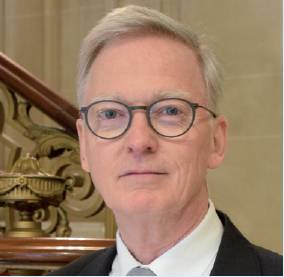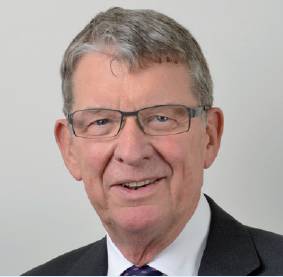Message from RAeS
Message from RAeS
 I am honoured to take on the role of President of our prestigious Learned Society, dedicated to the entire aerospace, aviation and space community and with a glorious history going back over 155 years.
I am honoured to take on the role of President of our prestigious Learned Society, dedicated to the entire aerospace, aviation and space community and with a glorious history going back over 155 years.
I wish to thank my predecessor, Professor Jonathan Cooper, for presiding over the Society through what has been a very challenging and unusual two years and for providing excellent leadership and guidance throughout. I also wish to thank Rear Admiral Simon Henley for completing the three terms of his presidential mandate and to welcome Air Commodore Peter Round into the fold as President-Elect.
In the wake of the Covid-19 pandemic, the Society, under the guidance of Council, the direction of the Board of Trustees and led by our Chief Executive, has been able to realign itself to ensure continuity and enhancement of our support and services. In particular, we have seen a full and successful transition to virtual conferences and events, enabling participation of international speakers and engagement with an ever-broader audience. We have also seen Society enhancement of the career support services for those impacted by the pandemic. Very importantly, our objective to increase engagement regarding diversity and inclusion, is advancing well.
The road towards recovery is long but, thanks to the continuing engagement of Society members, Corporate Partners and of the executive team, we will, together, ensure that revival not only succeeds but is both safe and sustainable.
As President in the year that the UK will host COP26 in Glasgow, I will ensure that we not only continue our ongoing actions regarding sustainability and the goal to reduce aviation-related carbon emissions on Earth but also to protect the Earth’s space environment through the effective understanding and management of space debris, an ever-increasing threat to our ability to exploit space systems in the future.
In parallel, we need to increase awareness of the important role space plays in our everyday lives, not only in terms of the comparatively high economic return but also for global observation of the climate and of our environment for peace and sustainability, as elaborated in the recent UK Integrated Review (see pp 14-19), addressing the role of space in defence, alongside the creation of the new UK Space Command.
Last but not least, I intend to continue to encourage young people from all backgrounds, and particularly those currently under-represented in our sectors, such as women and girls, those from minority ethnic groups and others, to enter the sector. To achieve this aim we would call on each Branch and Specialist Group to help create a more diverse and inclusive network across the Society’s pillars of activities.
It is our collective obligation to ensure that the Society continues to attract and retain people at all levels and across the aerospace, aviation and space domains to support the Society through membership and active engagement in the Society Committees, Boards, Branches, Divisions and Specialist Groups.
Thanks to the continued support of all our members, our Corporate Partners, our sponsors and the executive team, we will fulfil our ultimate goal for the Society to continue to be recognised as the leading global professional body respected as an independent source of knowledge in aerospace, aviation and space and offering continued professional development to its members.
Sir Brian Burridge
 - As we approach the summer, it is increasingly evident that the recovery of European aviation from the pandemic is going to be a slow process. Travel restrictions, slow vaccination rates and new Covid variants mean that passenger traffic is at about one-third of the norm for this time of year and 64% of the global aircraft fleet remains grounded. With a few exceptions, airlines will not break even in 2021. On a brighter note, the Bilateral Safety Agreement between the CAA and EASA has now been signed, setting out the process of mutual recognition of certification arrangements. Equally, in spite of the pressure on balance sheets, the aerospace and aviation industries are showing increased momentum towards the introduction of sustainable aviation fuels (SAF). As the UK’s Sixth Carbon Budget (which will shortly pass into law) makes clear, SAF will be the early-years’ solution to the carbon challenge while alternative technologies mature: the challenge will be to make SAF affordable.
- As we approach the summer, it is increasingly evident that the recovery of European aviation from the pandemic is going to be a slow process. Travel restrictions, slow vaccination rates and new Covid variants mean that passenger traffic is at about one-third of the norm for this time of year and 64% of the global aircraft fleet remains grounded. With a few exceptions, airlines will not break even in 2021. On a brighter note, the Bilateral Safety Agreement between the CAA and EASA has now been signed, setting out the process of mutual recognition of certification arrangements. Equally, in spite of the pressure on balance sheets, the aerospace and aviation industries are showing increased momentum towards the introduction of sustainable aviation fuels (SAF). As the UK’s Sixth Carbon Budget (which will shortly pass into law) makes clear, SAF will be the early-years’ solution to the carbon challenge while alternative technologies mature: the challenge will be to make SAF affordable.
- Another Covid milestone passed with the Society holding a virtual SGM and AGM in early May. Predictably, attendance was about three times the norm and the membership approved the proposed changes to the By-Laws: you can view the meeting on the governance page of our website. The meeting also saw the ceremonial handover of the Presidency with Howard Nye taking over from Jonathan Cooper who had endured a two-year stint because of Covid disruption. We owe Jonathan our thanks for his leadership and good humour during a very testing and unique time for the Society. Our congratulations go to the new Council members who are listed on p 50 and our thanks go to those members who are standing down for their contribution and commitment but I do urge continued engagement in other Society activities. Our Digital Communications Team produced a 2020 highlights video for the AGM which is worth you watching.
- Our Project Altitude programme, generously supported by Boeing, moves on apace with a new focus on secondary schools, where July will see a virtual careers insight day for academies in the West Midlands offering a combination of hands-on engineering activities, competitions and livestreamed talks. In addition, working in partnership with Aerobility and Middlesex University, Falcon2 will bring inclusive engineering into the classroom with the goal of creating a fully accessible flight simulator. There are many ways in which you can be involved from project management to support for a local school: please contact careers@aerosociety.com. You should also be aware that we have partnered with the Chartered Management Institute to offer Society members, who are professionally registered at Chartered Engineer or Incorporated Engineer, a fast-track route to Chartered Manager status.
- Turning to The Aeronautical Journal, perhaps as an unexpected ‘lockdown benefit’, the number of submissions so far for 2021 is well ahead of the norm. Interestingly, the rejection rate is lower, which leaves us well placed with a good crop of future articles by which to satisfy the increased appetite for the Journal which is now free to access for Society members. Plans are afoot for a special issue of The Aeronautical Journal in 2022 to mark its 125th anniversary. Eminent authors from across the subject range have been asked to produce ‘review’ articles which we hope will be of interest to a large readership. Also, the NAL will reopen in the coming weeks and work is in hand to integrate a new library management platform to enhance the catalogue and aid knowledge management. Of note, congratulations go to AEROSPACE Editor-in-Chief, Tim Robinson FRAeS, who has been announced as a finalist for the 2021 Aerospace Media Awards in the category of Best Commercial Aviation submission for his article on Airbus’ plans on the decarbonisation of aviation with a zero-carbon airliner. https://www.aerosociety.com/news/airbus-spearheads-european-moonshot-for-zero-carbon-aviation/
- Moving to dates for your diary, for Corporate Partners, we have Karen Dee, CEO of AOA (the Voice of Airports), to brief on aviation’s recovery from Covid-19. Karen has been notable for her efforts in making government and parliamentarians understand the plight of aviation during the pandemic. On conferences, 7-9 September sees us hosting the 47th European Rotorcraft Forum as a virtual event. The forum is one of the premier events in the rotorcraft community’s calendar bringing together manufacturers, research centres, academia, operators and regulatory agencies to discuss advances in research, development, design, manufacturing, testing and the operation of rotorcraft. Later that month, the International Flight Crew Training Conference on 21-22 September will examine the implications of the pandemic on aircrew training.
- Finally, on senior staff changes, our thanks go to Dawn Nigli, who has now moved on from the Society to pursue her other passion of sustainability. We welcome Richard Toomer as our new Head of External Affairs who joins us from BALPA and so has a wealth of knowledge and experience of many of the issues currently facing our sector.